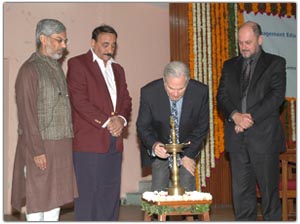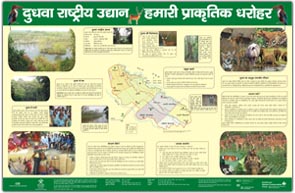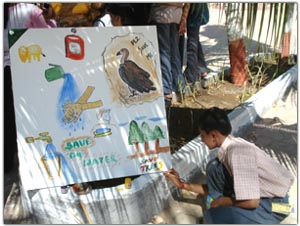 |
Gujarat University & CEE
launch:
Management Education Centre
on
Climate Change (MEC-CC) |
|
|
 |
|
Lighting the way for Climate Change education. L-R:
Mr. Kartikeya Sarabhai, Dr. Parimal Trivedi,
Mr. John McCarthy, and Dr. Tim
Flannery |
|
Dr. Tim Flannery, internationally acclaimed Australian
environmentalist launched MEC-CC on
2 February 2009 at Gujarat University (GU). The Centre is a
collaborative initiative of GU & CEE. The event received
an overwhelming response from faculty members and
students.
Dr. Parimal Trivedi,
Vice Chancellor, GU in his speech briefed about
objective of the Centre and various courses proposed for
the next academic year. He urged students to take this
opportunity and become green managers for the society.
Mr. John McCarthy, Australian High Commissioner to India
appreciated the step taken
by both the institutes. In his lecture Dr. Flannery
addressed issues related to scientific aspects of climate
change, its impacts and actions required to tackle climate
change issues. The lecture was followed by a lively question�answer session.
More |
|
|
|
|
CEE Canada!
 CEE
Canada was formally registered on 11 February 2009 at
Ontario, Canada. CEE Canada becomes the third
international affiliation of CEE
India
after Australia and Sri Lanka. The Founding Directors of
CEE Canada are Dr. Charles Hopkins (Chair, Reorienting
Teacher Education, York University), Dr. David V. J. Bell
(Professor Emeritus, Senior Scholar and Former Dean,
Faculty of Environmental Studies, York University), and
Mr. Tom Tamblyn (Chair, Dearness Environmental Society).
Brijpal Patel, Programme Coordinator, CEE will be
Officer-in-charge of CEE Canada office. CEE
Canada was formally registered on 11 February 2009 at
Ontario, Canada. CEE Canada becomes the third
international affiliation of CEE
India
after Australia and Sri Lanka. The Founding Directors of
CEE Canada are Dr. Charles Hopkins (Chair, Reorienting
Teacher Education, York University), Dr. David V. J. Bell
(Professor Emeritus, Senior Scholar and Former Dean,
Faculty of Environmental Studies, York University), and
Mr. Tom Tamblyn (Chair, Dearness Environmental Society).
Brijpal Patel, Programme Coordinator, CEE will be
Officer-in-charge of CEE Canada office.
The major
thrust areas identified by the Board for CEE Canada are:
� Building
Bridges � reaching out to the South Asians and New
Canadians for an inclusive dialogue and strategy for
Education for Sustainable Development
� Global Partnerships for Sustainable Future
� Building on local Ontario and Canadian initiatives
� Research and material development consultancy, including
adaptation of existing material in diverse cultural,
geographical and social context.
Contact:
[email protected]
|
|
|
|
|
Showcasing
community approaches to sustainable actions
Ms. Monique Barbut, CEO and
Chairperson of GEF visited the stall set up
by
Small Grants Programme (SGP) India, Ministry of Environment &
Forests (MoEF) Government of India (GOI). CEE, facilitated the exhibition stall at Delhi Summit
for Sustainable Development (DSDS) organised by TERI (The
Energy and Resources Institute), as the National Host Institute for
SGP with Nayanika Singh.
Ms. Barbut and Mr. Namo Narayan Meena, Minister of Environment &
Forests,
expressed their appreciation at the display of the SGP partners
and Self Help Groups and their full support for SGP activities.
|
|
|
|
Park
Education Package
A school
education package on
Dudhwa
National Park, Uttar Pradesh was launched by students of a
school in Dudhwa on the occasion of World Wetlands Day. The
event, organised in an interior
school of
Tharu
habitation located in buffer zone of Dudhwa National Park, had
around 250 students of two schools taking part in a number of
activities.
CEE is
working in Dudhwa on a community based project on Natural
Resource Management for biodiversity conservation. School
package was developed by CEE as part of its school initiative
in Dudhwa. |
 |
|
School
package includes a poster on Dudhwa covering background
information, importance, threats and ways of conservation;
and a booklet for teachers to help them in conducting
educational activities on biodiversity conservation. |
|
|
|
|
JOL
activities @ www.greenteacher.org
Around
60 activities from the Joy of Learning series have been
added to the Green Teacher Website
www.greenteacher.org. Local language text has been
enabled and users can directly download Unicode font and
enter text into Green Teacher (activities, projects,
discussion forum inputs, etc) in Indian languages. The
font to be used is a phonetic one, and it is simple to
use. Local language text will be regularly carried on
the website. |
GIS in ESD
A
Geographical Information System (GIS) is a database system
with specific capabilities for spatially referenced data. CEE
has formed a GIS Cell with the motive to enable improved
education and communication. GIS Cell will facilitate several
ESD efforts like complex analysis, simple representation,
networking, better reliability and accuracy.
CEE�s GIS
Cell aims to become an important tool for information
dissemination, education and research programmes related to
different aspects of work like monitoring status quo;
projecting; modeling, etc. GIS, as an interoperable
technology, sets a stage for collaborative working between
several project teams working at varied locations. It allows
users to share information leading to efficient working and
planning. |
|
|
|
A Green
Yatra

6,500
eco clubs under the NGC programme in
Gujarat celebrated their annual event with a Prakriti Yatra (Nature
Tour). Buses with students, teachers, district
coordinators and master trainers took off from each of the
five zones to congregate at an eco fair at Junagadh at the
foot of the famous
Girnar
Mountain.
The Yatra
and event provided opportunity for much sharing, learning,
and infused fresh enthusiasm and energy to carry forward
the eco club activities.
More |
|
|
|
World
Wetlands Day celebrated in Kashmir
World
Wetlands Day 2009 was celebrated in a remote hilly village
Salamabad in Himalayan state of
Jammu and Kashmir.
A day long awareness programme attended by around 110
students, teachers and parents was held at Government
Primary School Salamabad, Uri. Damaged in 2005 earthquake,
this school has been reconstructed as a part of CEE�s
rehabilitation programme.
Participants were apprised of history and importance of
World Wetlands Day and the Ramsar Convention. Degradation
of local wetlands was highlighted while discussing this
year�s theme �Wetland and River Basin Management�.
According to the villagers, two third of Kashmir�s
wetlands have been vanished during past 50 years. Jehlem,
the main river in Baramulla district is plagued by massive
silting and encroachment. High Altitude Wetlands are
exposed to added threats due to the climate change impact.
Children talked about wetlands during a 3 minute speech
competition. They also participated in wetlands quiz and
expressed their creativity on importance of wetlands in
their life through a painting competition. |
|
|
|
|
www.ceeindia.org |
CEE
|

